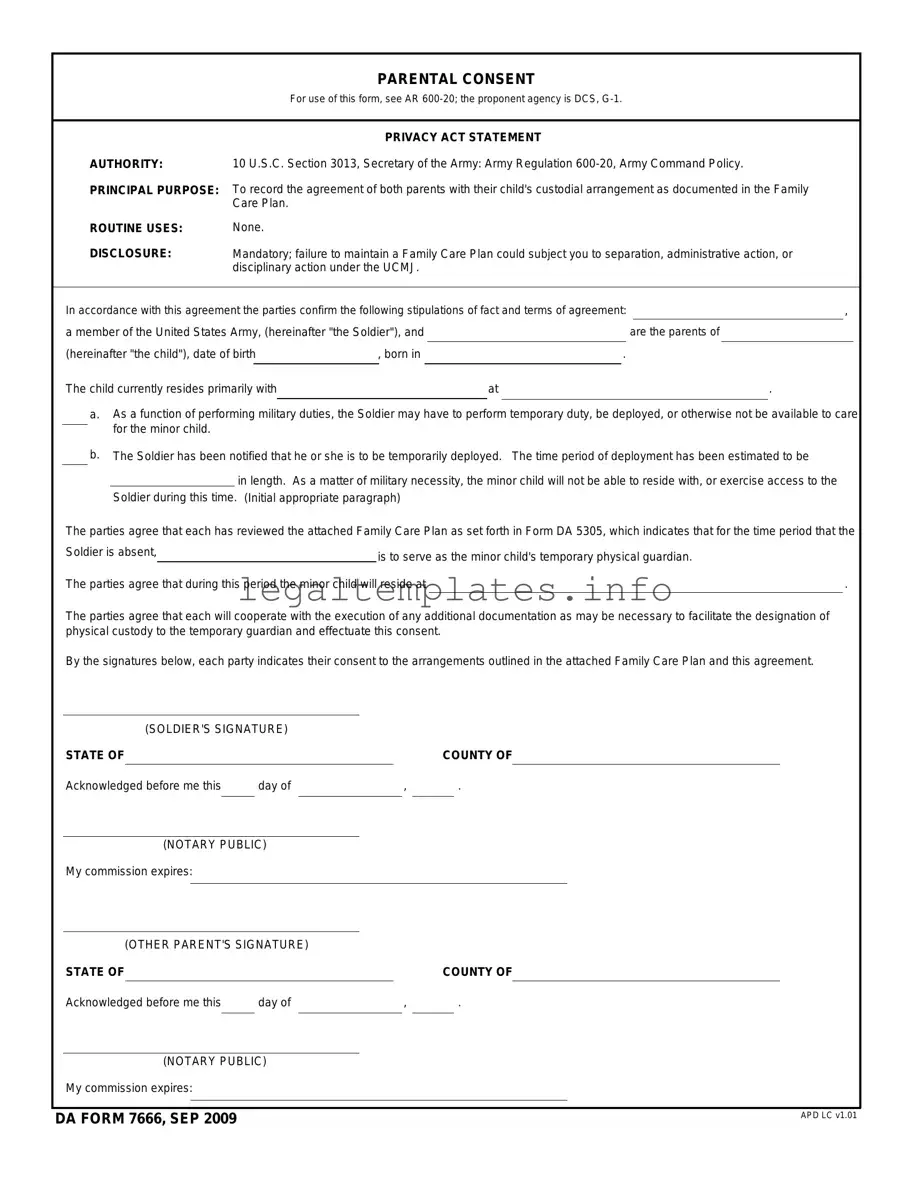The DA Form 7666, Parental Consent, shares similarities with the Department of Defense Form 1172, Application for Identification Card/DEERS Enrollment. Both forms are crucial in the process of enrolling family members in military-related benefits. The DA Form 7666 is necessary for obtaining parental consent for various activities and programs, while the DD Form 1172 is required for enrolling dependents into the Defense Enrollment Eligibility Reporting System, allowing them to receive military ID cards and access benefits. Each form plays a pivotal role in linking family members to military services and benefits.
Likewise, the DA Form 2028, Recommended Changes to Publications and Blank Forms, bears resemblance to the DA Form 7666 in its administrative nature. Although the DA Form 2028 is used for submitting suggestions for improvements to Army publications and forms, both documents facilitate a feedback loop within Army operations. They each serve as a means for individuals to communicate their needs or recommendations to higher authorities, emphasizing the importance of individual input in organizational processes.
The Consent for Medical Treatment form, used widely across various healthcare settings, also shares common ground with the DA Form 7666. These documents are both designed to ensure informed consent is formally recorded. The DA Form 7666 captures parental consent for minors participating in certain activities, while the Consent for Medical Treatment form documents agreement to medical procedures. Each serves a protective legal function for both the provider and recipient of the service or activity.
The School Permission Slip is another document similar to the DA Form 7666, as it is also used to obtain parental or guardian consent. School Permission Slips often seek approval for students to participate in school trips or events, similar to how the DA Form 7666 might be used for activities associated with military family programs. Both ensure that guardians are informed and agree to the participation of their ward in specific activities.
The Family Educational Rights and Privacy Act (FERPA) Release Form is akin to the DA Form 7666 in its emphasis on privacy and consent. The FERPA Release Form is utilized in educational institutions to gain permission to share a student's educational records, similar to how the DA Form 7666 might be used to authorize participation in programs that require sharing of certain personal details. Both are vital in protecting the privacy and rights of individuals.
The DA Form 31, Request and Authority for Leave, parallels the DA Form 7666 through its process of requesting permission. While the DA Form 31 is specifically for soldiers to request leave from their duties, the DA Form 7666 involves parental consent for minors. Each document necessitates an authority's approval before proceeding with the requested action, highlighting the structured decision-making within organizations.
The Child Travel Consent form is also comparable to the DA Form 7666. This document is used to grant permission for minors to travel without their parents or guardians, similar to how DA Form 7666 might permit participation in special programs or activities. They both play a crucial role in ensuring minors are safeguarded and allowed to partake in activities under authorized consent.
The HIPAA Release Form, which permits the sharing of an individual's health information with specified parties, mirrors the DA Form 7666 in terms of consent and privacy protection. While the DA Form 7666 might cover a broad range of consent-related needs within the military context, the HIPAA Release Form is specifically focused on health information. Each form respects the individual's privacy while facilitating necessary communication.
The Volunteer Consent Form, used by various organizations to obtain agreement from participants for voluntary services, aligns with the DA Form 7666. While one is tailored toward voluntary services, the DA Form 7666 can be seen as a means to consent to participation in specific military-affiliated programs. They each ensure volunteers or participants are aware of and agree to the terms and conditions of their involvement.
Lastly, the Parental Acknowledgment of Student Conduct Code is similar to the DA Form 7666, as it also seeks parental acknowledgment and consent, this time regarding behavior and ethical expectations in an educational setting. Like the DA Form 7666, which might cover consent for participation in behaviorally based programs or activities, this document ensures parents are informed and agree to certain standards of conduct for their children. Both types of forms promote understanding and agreement on expectations and rules.


